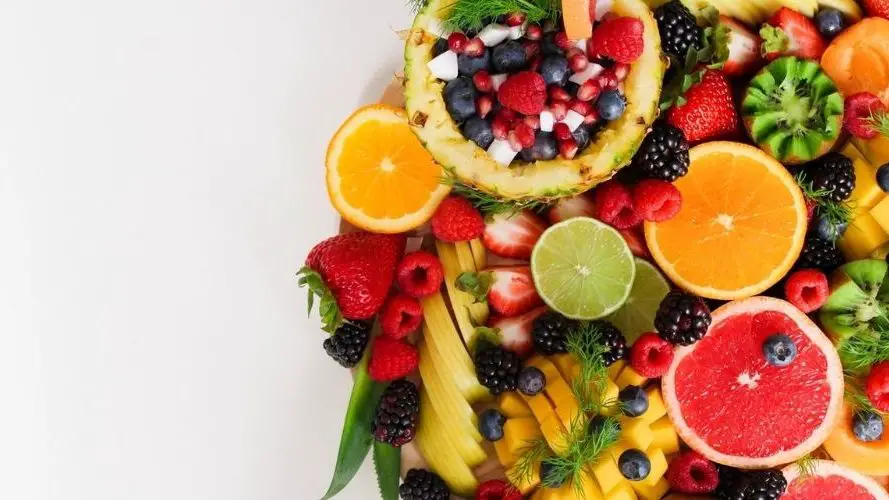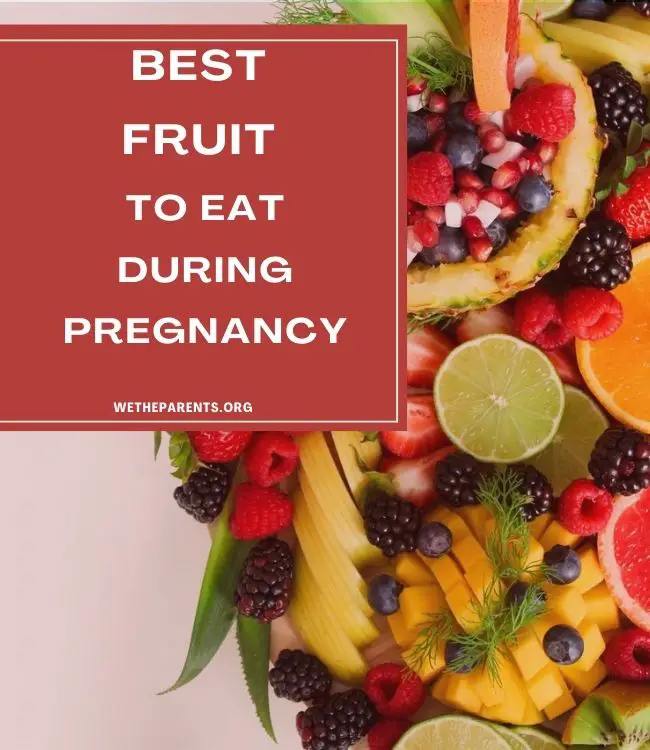Pregnancy diet restrictions can be overwhelming. At the end of the day, most moms-to-be just want to know that they’ve eaten the most delicious, nutritious food possible.
That’s why we’ve honed in on the best fruits to consume during gestation. If there’s any source of nourishment that’s going to provide you with the vitamins and minerals you need, fresh fruit is it.
Nine pregnancy super fruits
Everyone has at least one favorite fruit! Hopefully, yours is on our list of the top 10 fruits to consume during gestation.
Apples
Does an apple a day really keep the doctor away? These tree-grown fruits are high in fiber, vitamin A, vitamin C, iron, calcium, and potassium, all of which are essential to the health and development of a growing fetus.
The fiber and bacteria in apples also make them excellent for gut health and digestion, both of which are issues that sometimes plague expectant mothers. 1The Nutrition Source – harvard.edu
Oranges
Oranges are an outstanding source of vitamin C, folate, iron, and water. Regular consumption of oranges during pregnancy may help you cope with constipation, elevated blood pressure, dehydration, and skin issues.
One orange contains 40 to 50 mcg of folic acid. Regular consumption of oranges can lead to a reduced risk of neural tube defects.
Keep in mind that highly acidic citrus fruits could cause your gastroesophageal reflux disease (GERD) or morning sickness symptoms to flare up.
Bananas
Bananas are one of the most inexpensive, readily available, and, arguably, most delicious fruits on the market.
A single banana is low in calories and a good source of protein, vitamin A, vitamin C, potassium, dietary fiber, folate, vitamin B6, omega-3, omega-6, and more. 2Bananas raw nutrition data
Bananas help quash pregnancy symptoms, including nausea and constipation. They also offer some of the vitamins and minerals necessary for healthy fetal development. 3Healthy Eating for Gestational Diabetes
fhft.nhs.uk
Pregnant women can safely consume one to two medium-sized bananas a day. Be sure to eat the brown spotted variety of these pulpy fruits as they contain the most antioxidants and are easiest to digest.
Berries
As superfoods, berries are low in calories and rich in vitamins and minerals. We strongly advise you to incorporate them into your pregnancy diet. They are a good source of:
- Antioxidants
- Fiber
- Folate
- Vitamin C
- Manganese
According to the European Respiratory Journal, a maternal diet rich in antioxidants may decrease a baby’s chance of developing asthma and other lung issues. 4Bédard, A., Northstone, K., Holloway, J. W., Henderson, A. J., & Shaheen, S. O. (2018). Maternal dietary antioxidant intake in pregnancy and childhood respiratory and atopic outcomes: birth cohort study. European Respiratory Journal, 52(2), 1800507.
Avocados
Bring on the avocado toast, because these soft, green fruits are chock-full of vitamins and minerals essential to expectant mothers and their developing babies. A single avocado contains an abundance of nutrients, including:
- Monounsaturated “good” fats
- Dietary fiber
- Antioxidants
- Folate
- Vitamin B6
- Vitamin K
- Copper
- Riboflavin
- Potassium
- Vitamin E
- Niacin
Studies show that avocados are an excellent addition to the diets of women who are either trying to get pregnant, are actually pregnant, or are lactating. 5Comerford, K. B., Ayoob, K. T., Murray, R. D., & Atkinson, S. A. (2016). The role of avocados in maternal diets during the periconceptional period, pregnancy, and lactation. Nutrients, 8(5), 313.
Apricots
Apricots are excellent sources of vitamins, minerals, and antioxidants, including:
- Vitamins A
- Vitamin C
- Vitamin E
- Potassium
- Fiber
- Protein
Mangoes
Many pregnant women enjoy snacking on sweet and squishy mangoes. These delectable stone fruits offer a wealth of essential pregnancy nutrients, including: 6Van Duyn, M. A. S., & Pivonka, E. (2000). Overview of the health benefits of fruit and vegetable consumption for the dietetics professional: selected literature. Journal of the American Dietetic Association, 100(12), 1511-1521.
- Dietary fiber
- Vitamin C
- Copper
- Folate
- Vitamin B6
- Vitamin A
Ripe mango is an excellent addition to smoothies, fruit plates, and other meals. These tropical fruits contain antioxidants and essential nutrients.
Pomegranates
Pomegranates offer a generous amount of vitamins and minerals, including:
- Vitamin C
- Dietary fiber
- Protein
- Vitamin K
- Folate
- Potassium
Kiwi fruits
Are you fond of these furry green and brown fruits? If so, you’ll be happy to know that they’re host to several nutrients, including:
- Dietary fiber
- Calcium
- Magnesium
- Phosphorus
- Potassium
- Copper
- Vitamin C
- Folate
- Beta Carotene
Kiwis are a good source of folic acid, which prevents neural tube defects. There are approximately 17 mcg. of folic acid in one kiwi. 7What Are the Benefits of Eating Kiwi Fruit During Pregnancy?
The importance of proper prenatal nutrition
Fruits and vegetables are the foundation of healthy nutrition. These nutrient-dense foods enable pregnant women to meet their daily diet requirements. Let’s see how maternal diets impact the essential stages of fetal development.
Folic Acid: The U.S. Center for Disease Control and Prevention (CDC) recommends that expectant women consume 400 micrograms (mcg.) of folic acid every day.
Folic acid supports the development of the neural tube and, without enough, an unborn fetus may develop brain or spine diseases, including anencephaly and spina bifida. 8Folic Acid
cdc.gov
Fortunately, citrus fruits, bananas, and avocados are excellent sources of folic acid.
Editor’s tip
In addition to eating a healthy diet with plenty of fruits and vegetables, take a folic acid supplement before attempting to get pregnant, or as soon as you discover you’re pregnant.
Vitamin C: The American Pregnancy Organization recommends that pregnant women consume 86 mg of vitamin C per day.
According to the National Institute of Health (NIH), vitamin C is responsible for the development of collagen, L-carnitine, and various neurotransmitters.9Sun, Q., Qiu, H., Huang, M., & Yang, Y. (2020). Lower mortality of COVID-19 by early recognition and intervention: experience from Jiangsu Province. Annals of intensive care, 10(1), 1-4.
Vitamin C also plays an essential role in the body’s ability to metabolize iron, though it’s necessary to note that excess vitamin C supplement consumption can cause several health issues.
Vitamin A: Vitamin A is a crucial element of prenatal nutrition and you should be able to get all you require from your diet.
Too much vitamin A in pregnancy can also harm your baby, so it’s recommended NOT to eat liver or liver products like pâté, and that you abstain from supplements containing vitamin A or retinol.
Vitamin B6: Vitamin B6 is essential to maternal and fetal health and is known to reduce the effects of morning sickness. 10Vitamin B6 for Morning Sickness
uofmhealth.org
Studies show that 10 to 25 milligrams may reduce hormone-induced nausea and vomiting. Bananas are one of the few fruits that contain vitamin B6.
Potassium: Be sure to eat plenty of potassium during pregnancy. Pregnant women need approximately 4,700 milligrams of potassium daily.
This mineral plays a major role in human development. The best way of meeting your daily intake requirement is by eating plenty of potassium-rich fruits and vegetables, such as bananas, potatoes, prunes, and oranges.
Potassium deficiency can cause several health problems in otherwise healthy pregnant women. Signs of potassium deficiency include severe nausea, vomiting, and diarrhea.
Antioxidants: Antioxidants are an integral part of prenatal nutrition, and fruits happen to be one of the best sources of these amazing micronutrients.11Jenkins, C., Wilson, R., Roberts, J., Miller, H., McKillop, J. H., & Walker, J. J. (2000). Antioxidants: their role in pregnancy and miscarriage. Antioxidants and Redox Signaling, 2(3), 623-628.
hsph.harvard.edu
Regular consumption of antioxidants may also reduce birth defects related to alcohol consumption. 12Antioxidants During Pregnancy May Help Prevent Birth Defects Tied To Alcohol
sciencedaily.com Berries and stone fruits are some of the most reliable sources of antioxidants.
Maternal antioxidant deficiencies during pregnancy can lead to a number of complications, including preeclampsia, reduced fetal growth, and a baby’s increased risk for diseases (including cardiovascular disease and Type 2 diabetes) in adulthood. 13Mistry, H. D., & Williams, P. J. (2011). The importance of antioxidant micronutrients in pregnancy. Oxidative medicine and cellular longevity, 2011.
Fiber: Fiber is also a crucial element of a healthy pregnancy diet. According to the International Journal of Women’s Health and Reproductive Sciences, pregnant women need to consume 25 to 35 grams of dietary fiber a day during pregnancy.14Importance of optimal fiber consumption during pregnancy
A diet high in fiber may reduce a woman’s chances of developing high blood pressure or preeclampsia during gestation. Raspberries, pears, apples, and bananas are just a few of the most delicious sources of dietary fiber.
Calcium: Calcium is yet another essential building block of fetal development. Pregnant women should consume 1,000 milligrams of calcium a day to achieve optimal fetal and maternal health. 15Glinoer, D. (2007). The importance of iodine nutrition during pregnancy. Public health nutrition, 10(12A), 1542-1546.
acog.org
While prenatal vitamins may offer a nominal amount of supplemental calcium, make sure to get your daily dose of this mineral from fresh fruits and vegetables, such as calcium-fortified orange juice, blackberries, guavas, papayas, and kiwis.
The best way to consume fruit during pregnancy
Here’s how to maximize the benefits of your fruit intake without having to compromise the flavors and diversity of the foods you eat.
Fresh fruit
One of the best ways to maximize the number of vitamins and minerals you take in each day is to eat fresh, organic fruits.
Fresh fruit is an excellent source of dietary fiber and water. Since digestive health and adequate hydration are essential to a healthy pregnancy, we cannot think of a better way to consume these delicious foods.
Editor’s tip
Wash all fruits and vegetables thoroughly to remove any traces of soil which could contain toxoplasma, a parasite which could harm your baby
https://www.nhs.uk/pregnancy/keeping-well/have-a-healthy-diet/
Dried fruit
It’s certainly safe to consume dried fruits during pregnancy. What’s more, dried fruit generally contains the same amount of vitamins and minerals as fresh fruit, the only difference being that it does not contain water.
Expectant mothers must limit their daily intake of dried fruit, as serving sizes will likely be smaller than that of equivalent fresh fruit portions.
Furthermore, excess dried fruit consumption can cause gastrointestinal issues and weight gain. Keep in mind that many dried fruits contain sugars, salts, and other flavor agents not beneficial to moms or babies.
Feel free to eat dried fruit in moderation, but remember to include fresh fruit in your diet.
Fruit juice and smoothies
Be careful when drinking fruit juice during pregnancy.
For one, steer clear of packaged, unpasteurized fruit juices and smoothies, as these may contain bacteria that are harmful to your unborn baby.
Be mindful of packaged fruit juices that contain sweeteners and additives such as cane sugar or high-fructose corn syrup.
Whenever possible, opt for whole fruits over fruit juices, especially if suffering from gestational diabetes, or high blood sugar, during pregnancy. 16REPRODUCTIVE HEALTH AND THE WORKPLACE
cdc.gov
Wrapping up
A woman’s nutritional intake during pregnancy will have a direct impact on her fetal health, labor, delivery, and lactation. Fortunately, fruits (especially organic!) are among the tastiest and most nutritious foods on Earth.
When you’re ready to develop a diet for pregnancy and beyond, eat plenty of fresh, organic produce!






